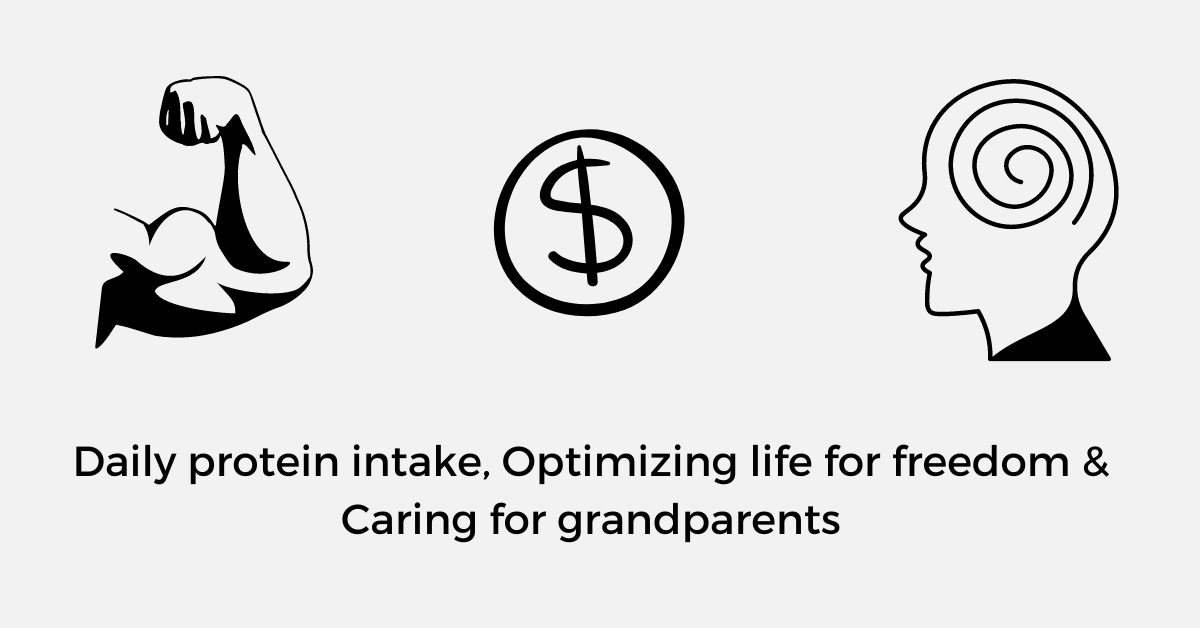Physical Health 💪
The Art of Distributing Daily Protein Intake
One of my close friends who is not only smart but also very hardworking said:
“I consume only one meal in a day and reach my protein target of 150gm with that”
This was a bold claim to make.
The fact that he has only one meal made sense for someone who is cutting.
But what I couldn’t digest was him digesting 150 gm of protein in a single sitting. (You saw what I did there?)
That’s when I got to studying and found:
The reality is you can absorb almost all of the protein that you consume.
This was surprising.
But the key to remember is “nutrient absorption” is your food going through the digestive system to enter the bloodstream.
“Protein absorption” should matter to us. What should matter is whether this protein is used in building muscle.
For this, you must understand what Muscle Protein Synthesis (MPS) is.
Simply said, it is the process by which the body builds new muscle proteins.
So every time you consume protein, you’re basically hitting the “Start” button on the MPS factory.
When protein is digested, it gets converted into amino acids, which triggers the MPS process.
So, the more protein you consume, the more amino acids enter the bloodstream, and more MPS gets activated.
But all of it happens up until saturation point after which MPS hits capacity.
Beyond a certain point, excess amino acids in your bloodstream don’t lead to a further increase in MPS.
But your protein doesn’t get wasted. It gets converted into glucose (aka sugar), which can be used as fuel or stored as fat.
This is why we should have protein multiple times a day, so that MPS can be activated more often and more protein can be used to create more muscle.
And while having too much protein in one meal isn’t a total waste, it doesn’t actually help you build more muscle.
But, things seem to be working just fine for my friend.
Although 30-40 gm of protein is recommended per sitting, his 150 gm meal is giving him results.
So do what works for you. But in general, you are better off listening to me than my friend 🙂
Financial Health 💰
Optimize for freedom; not money
It is crazy to reflect on how far I’ve come in my journey toward financial well-being. It’s like I’ve grown up, not just in age, but in the way I think about money.
Back in the day, my idea of financial freedom was all about chasing the highest returns in the stock market, doing whatever it took to pump up my net worth.
I thought that was the golden ticket – raking in those high percentages and watching my wealth skyrocket. It was like a race, and I was determined to be the Usain Bolt of net worth.
But as I delved deeper into personal finance as a student, something shifted within me. I started realizing that financial freedom was more intricate than just a game of numbers.
It was about understanding the psychology behind it all. That lightbulb moment happened when I stumbled upon Naval Ravikant.
His ideas about leveraging capital, code, and content resonated with me, making me realize that stacking up assets was the real deal.
It’s like I pivoted from being fixated on the end number of my net worth to a mindset of creating various income streams through different assets.
I was already leveraging capital. It was time to leverage content in my favour too.
It’s no longer about a single grand jackpot, but rather a symphony of smaller wins that play together to give me financial stability.
But even then, guess what? I was still on a wild goose chase after money.
Sure, my strategies had evolved, but the ultimate goal was Gandhi.
I was still caught in the loop of optimizing every aspect of my life for the sake of money.
Then, recently, I stumbled upon Justin Welsh’s insights, and it was like a thunderbolt hit me. “What if,” he asked, “we shifted our focus from optimizing for money to optimizing for freedom?”
And it hit me like a ton of bricks.
That’s the essence of true financial health – having the ability to do what you want, when you want, with the people you want.
It was like a switch flipped in my mind.
The frantic pursuit of more projects, more income sources, more everything suddenly seemed counterproductive.
Because, let’s face it, what’s the use of stuffing your calendar with money-making endeavors if it means you’ve got no time left to actually live?
Now, my game plan has shifted. It’s NOT about grabbing every new opportunity that comes my way.
It’s about taking a step back and diving deep into the existing projects, figuring out how to make the most out of them without drowning in work.
The end goal? Maximum monetary benefit with minimal time investment.
PS: Funny how I am preaching about not taking up new projects in the very first edition of my latest venture. But you know what? It’s all part of the learning curve, and I’m embracing it.
Because in the end, it’s not just about the money – it’s about crafting a life where financial freedom and personal freedom dance hand in hand.
Mental Health 🧠
Caring for old grandparents
I lost both my grandfathers during COVID. It wasn’t due to COVID but during that time.
The news of their demise came as a sudden shock.
I knew they were getting old, but they left for their heavenly abode a bit too soon.
May god rest their soul in peace.
I was fortunate enough to be present when they were alive and even when they left.
The ceremonies were painful and filled my heart with sorrow.
While I long to spend more time with them if I ever get the chance, I am filled with zero regrets because I knew I always gave them my best.
My best love and respect.
But these incidents only reinforced my mindset towards relationships.
Time on this floating space rock is finite. Sahil Bloom shared a beautiful piece showing how we people spend time in our lives as we age.
Time spent with family and friends goes down significantly.
He also did some math for us here which I still remember today.
Both my grandmothers are still alive. They do not have much time left on Earth.
I meet them at most 4 times during the year.
They have a couple more years to live.
That means I will only ever get to meet and spend time with them for next < 20/25 times – that is assuming I am not a phubber.
That is an alarmingly low number.
And it is this very number which I keep in mind whenever I spend my time with them.
I always remember this might be the last time I hold their hand while they complain about their paining knees.
Maybe the last time I hug them.
While it is scary, it only makes me feel even more alive in their companion.
And I don’t want anything besides that.
As our family members get older, the only thing they hold dear is the people around them.
Giving them hope and love makes all the difference in their world.
Doing that is the least we owe to them.
Even if you don’t want to do it for their sake, do it for yourself.
Because you will never regret that.
Go hug your family now, while you still have them.



Leave a Reply